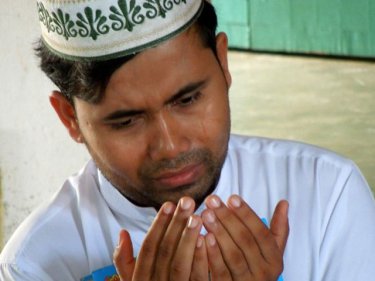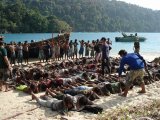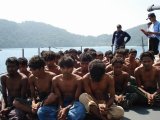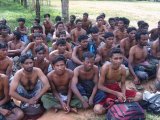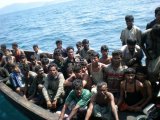PHUKET: Rohingya fear the latest bloodshed in Burma will lead to their extermination, a man named Rasat told Phuketwan by mobile telephone this afternoon.
Speaking from Sittwe, the biggest town in Rakhine State, where the violence continues, Rasat said he had seen petrol bombs being filled and thrown into houses, mosques and schools.
''Muslims are burning Buddhist houses and Buddhists are burning Muslim houses,'' he said. ''The difference is that when a Buddhist burns a Muslim house, nothing is done. When a Muslim burns a Buddhist house, he gets shot.''
It's feared long-standing distrust and hatred could lead to massacres or worse unless the authorities in Burma are able to control the rising antagonism between Buddhists and Muslims in Rakhine State, north-west Burma.
Greater freedoms have encouraged Buddhists in the region to speak more openly about their resentment of the Rohingya, even though the Muslim minority have been their neighbors for generations.
A small group of Rohingya men gathered at a mosque on Phuket today to pray for their family and friends. Tears were shed on Phuket about the possibility of more blood being shed in Burma.
These men have married Thai or Burmese women and lived at peace on Phuket for years, raising their children in a climate of tolerance.
In Rakhine State, about 750,000 stateless Rohingya eke out an existence as perhaps the world's most deprived people. Telephone links with Phuket have been patchy since the violence began a few days ago.
Phuketwan tried calling about 20 times without a signal going through before a telephone was answered inside Burma.
The man on the other end of the telephone told this reporter in Phuket that the Buddhists where he was speaking from, in the state capital of Sittwe, had been herded into a temple by the army and told to stay there.
The Muslims, he said, had all been herded into a patch in the open. He said he did not know where his children were, and feared he might not see them again. No food had been provided for the group, the man said.
As we spoke, a woman wailed a piercing wail in the background. ''Many people have been killed,'' the man said.
One man on Phuket said he had gotten through by mobile telephone to his father earlier today.
''My father said he did not want to move from the place he calls home. When I spoke to him, he said: 'This may be the last chance for us.''
Another man said that Rohingya were putting to sea in boats if they could. Border patrols in neighboring Bangladesh have been instructed to push back the vessels.
The saga of Rohingya boatpeople is familiar along Thailand's Andaman coast, where thousands have landed in recent years as they try to flee persecution in Burma.
The boats normally leave during the tranquil ''sailing season'' between November and April, and only men and teenage boys make the journey.
Now, the caller said, Rohingya men, women and children were taking to boats if they could, even though death at sea in the monsoon season is a possiblity. There is no choice, the caller said. To stay could mean certain death.
Speaking from Sittwe, the biggest town in Rakhine State, where the violence continues, Rasat said he had seen petrol bombs being filled and thrown into houses, mosques and schools.
''Muslims are burning Buddhist houses and Buddhists are burning Muslim houses,'' he said. ''The difference is that when a Buddhist burns a Muslim house, nothing is done. When a Muslim burns a Buddhist house, he gets shot.''
It's feared long-standing distrust and hatred could lead to massacres or worse unless the authorities in Burma are able to control the rising antagonism between Buddhists and Muslims in Rakhine State, north-west Burma.
Greater freedoms have encouraged Buddhists in the region to speak more openly about their resentment of the Rohingya, even though the Muslim minority have been their neighbors for generations.
A small group of Rohingya men gathered at a mosque on Phuket today to pray for their family and friends. Tears were shed on Phuket about the possibility of more blood being shed in Burma.
These men have married Thai or Burmese women and lived at peace on Phuket for years, raising their children in a climate of tolerance.
In Rakhine State, about 750,000 stateless Rohingya eke out an existence as perhaps the world's most deprived people. Telephone links with Phuket have been patchy since the violence began a few days ago.
Phuketwan tried calling about 20 times without a signal going through before a telephone was answered inside Burma.
The man on the other end of the telephone told this reporter in Phuket that the Buddhists where he was speaking from, in the state capital of Sittwe, had been herded into a temple by the army and told to stay there.
The Muslims, he said, had all been herded into a patch in the open. He said he did not know where his children were, and feared he might not see them again. No food had been provided for the group, the man said.
As we spoke, a woman wailed a piercing wail in the background. ''Many people have been killed,'' the man said.
One man on Phuket said he had gotten through by mobile telephone to his father earlier today.
''My father said he did not want to move from the place he calls home. When I spoke to him, he said: 'This may be the last chance for us.''
Another man said that Rohingya were putting to sea in boats if they could. Border patrols in neighboring Bangladesh have been instructed to push back the vessels.
The saga of Rohingya boatpeople is familiar along Thailand's Andaman coast, where thousands have landed in recent years as they try to flee persecution in Burma.
The boats normally leave during the tranquil ''sailing season'' between November and April, and only men and teenage boys make the journey.
Now, the caller said, Rohingya men, women and children were taking to boats if they could, even though death at sea in the monsoon season is a possiblity. There is no choice, the caller said. To stay could mean certain death.

